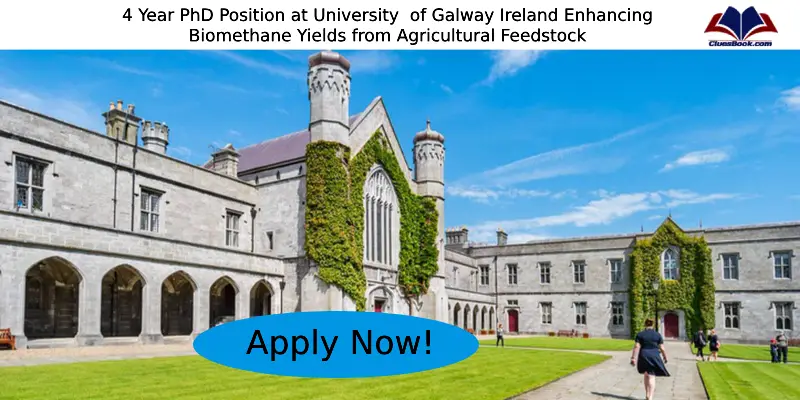Fully Funded PhD Scholarship at University of Galway: Enhancing Biomethane Yields from Agricultural Feedstock
Explore a fully funded 4-year PhD Position at the University of Galway Scholarship in Ireland focusing on improving biomethane yields from the agricultural feedstock.

Are you passionate about renewable energy technology and sustainable agriculture? Do you aspire to pursue a PhD in a field that combines cutting-edge research with real-world impact? The University of Galway is offering a fully funded PhD scholarship for 2024 to improve biomethane yields from agricultural feedstock. This is a unique opportunity for motivated individuals to contribute to advancing renewable energy technologies and sustainable farming practices.
The 2024 PhD project affiliated with the University of Galway’s West of Ireland research initiative will provide financial support to a student who will be registered to investigate the quality and storage of agri-food systems.
This project aims to enhance the long-term efficiency of chemical processes in biomethane production, contributing significantly to climate change mitigation. Meeting the academic entry requirements, the selected candidate will play a crucial role in advancing research that addresses pressing environmental challenges.
The University of Galway Ireland Scholarship 2024
The University of Galway Ireland Scholarship 2024, a leading high institution in research and innovation in Ireland, is inviting applications for a fully funded PhD scholarship in biomethane production. This 2024 scholarship is designed to support research to optimize and improve biomethane yields from agricultural feedstock, addressing key challenges in the renewable energy sector. Successful candidates will have the opportunity to work with a team of experts at the University of Galway, access state-of-the-art facilities, and contribute to groundbreaking research that can significantly impact energy sustainability.
Detailed About PhD Project
- Country: Ireland
- Financial coverage: Fully Funded
- Program: Postgraduate, PhD
- University: University of Galway
- Application Deadline: 15 /August/2024
- Funded by: The Teagasc Walsh
Financial Benefits
The fully-funded PhD scholarship covers:
- Tuition Fees: Full coverage of tuition fees for the duration of the PhD program.
- Stipend: A competitive annual stipend to support living expenses.
- Research Funding: Access to research funds for project-related expenses, including materials, travel, and conference attendance.
- Living allowance (Stipend): [€25,000] per annum, [tax-exempt scholarship award]
- University fees: [€6,000 per annum]
Research Focus: Improving Biomethane Yields
Biomethane, a renewable energy source derived from organic materials, offers a sustainable alternative to reduce fossil fuel emissions. However, optimizing its production from agricultural feedstock methane gas presents several challenges. This PhD project aims to:
- Identify and characterize agricultural feedstocks that are most suitable for biomethane production.
- Develop and test pre-treatment methods to enhance the biodegradability of feedstocks.
- Optimize anaerobic digestion processes to maximize biomethane yields.
- Evaluate the environmental and economic importance of improved biomethane formation methods.
Eligibility Criteria for the University of Galway Scholarship in Ireland
To be considered for this PhD scholarship at the University of Galway, applicants must meet the following criteria:
- Academic Qualifications: A master’s degree or equivalent in a relevant field such as environmental science, engineering, microbiology, or agriculture
- Field of Study: Applicants must have a degree (2.1 minimum) in environmental engineering, environmental science, microbiology, biotechnology, biochemical engineering, agricultural sciences or a related discipline
- Research Experience: Previous research experience in bioenergy, anaerobic digestion, or related fields is highly desirable.
- Skills and Abilities: Strong analytical, problem-solving, and laboratory skills. Proficiency in data analysis and scientific writing.
- Language Proficiency: Proficiency in English, both written and spoken.
Application Process For 2024 PhD Project
Interested candidates should prepare the following documents:
- Research Proposal: A detailed research proposal outlining the objectives, methodology, and potential impact of the proposed research.
- Academic Transcripts: Copies of academic transcripts from previous studies.
- Curriculum Vitae (CV): An up-to-date CV highlighting relevant experience and achievements.
- Letters of Recommendation: At least two letters of recommendation from academic or professional referees.
- Personal Statement: A statement of purpose explaining your motivation for pursuing this PhD scholarship and how your background aligns with the research focus at the University of Galway.
Applications should be registered in the University of Galway Ireland Scholarship 2024 online application portal by the specified deadline in 2024.
Why Apply For the Teagasc Walsh scholarship?
- Cutting-edge Research: Engage in innovative research that addresses critical challenges in renewable energy production.
- Expert Supervision: Work under the guidance of leading researchers at the Galway University.
- Career Development: Gain valuable skills and experience that will enhance your career prospects in academia, industry, or the public sector.
- Networking Opportunities: Collaborate with a diverse community of researchers and professionals at the University of Galway.
- Funding Support: Benefit from comprehensive funding that covers tuition, living expenses, and research costs throughout your study period.
The Teagasc Walsh Scholarship program is particularly noteworthy for its support of agricultural and environmental research, contributing to the overall impact of this program. The project has recently been funded and is aligned with the goals of the Agriculture and Food Development Authority, enhancing the focus on environmental and science-related challenges.
Note:
To Apply for the Scholarship: send your CV and a cover letter with the names and contact details of two referees to Prof. Xinmin Zhan or Dr. Ciara Beausang
- Contact Name: Prof. Xinmin Zhan, Dr. Ciara Beausang
- Contact Emai: xinmin.zhan@universityofgalway.ie, Ciara.Beausang@teagasc.ie
- Application Deadline: 15 /August/2024 time 12:00
- Primary Supervisor name Prof. Xinmin Zhan
- Start date: October 2024 and no later than February 2025
